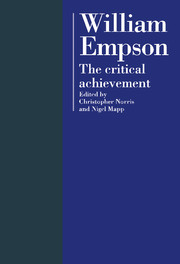Book contents
- Frontmatter
- Contents
- Contributors
- Foreword
- 1 Introduction: Empson as literary theorist: from Ambiguity to Complex Words and beyond
- 2 Empsonian honesty and the beginnings of individualism
- 3 Empson, Leavis, and the challenge of Milton
- 4 Empson's Satan: an ambiguous character of the seventh type
- 5 Compacted doctrines: Empson and the meanings of words
- 6 Figural narrative and plot construction: Empson on pastoral
- 7 More lurid figures: de Man reading Empson
- 8 Fool and pharmakon
- 9 William Empson's cosmicomics
- 10 Empson as teacher: the Sheffield years
- References
- Index
6 - Figural narrative and plot construction: Empson on pastoral
Published online by Cambridge University Press: 01 June 2011
- Frontmatter
- Contents
- Contributors
- Foreword
- 1 Introduction: Empson as literary theorist: from Ambiguity to Complex Words and beyond
- 2 Empsonian honesty and the beginnings of individualism
- 3 Empson, Leavis, and the challenge of Milton
- 4 Empson's Satan: an ambiguous character of the seventh type
- 5 Compacted doctrines: Empson and the meanings of words
- 6 Figural narrative and plot construction: Empson on pastoral
- 7 More lurid figures: de Man reading Empson
- 8 Fool and pharmakon
- 9 William Empson's cosmicomics
- 10 Empson as teacher: the Sheffield years
- References
- Index
Summary
No one who reads Some Versions of Pastoral (1935) can deny that William Empson made a significant contribution to the development of literary theory. Empson's reading of ‘heroic’ and ‘pastoral’ in English drama works out a new conception of plot - what he calls the double-plot ‘device’. He focuses on the distinction between the surface or manifest content of a given literary text and its deeper, underlying structures. Such a distinction allows him to disengage those techniques, mechanisms and devices which are to be discovered beneath the surface of the literary work. With Empson's innovative constructional model literary criticism takes on a new form which relinquishes the realm of everyday experience for systematic theoretical investigation (he uses the term ‘critical theorizing’). He brackets out the common sense and everyday ‘natural attitude’ that takes for granted the surface content of a literary text. He is then able to discern certain deep structures which have eluded traditional content analysis. Of course, it is indisputable that new and much more rigorous theoretical models have been refined since Empson published Some Versions. But his writings were one of the first systematic attempts to elaborate a theory of double plot which is independent of immediate experience and the natural object. Thus formal literary analysis still owes much to the distinction he drew between the manifest content of texts and their hidden deep structures.
This formal procedure which puts in parentheses the ‘naturalized consciousness’ of common-sense experience and everyday life is what is new in Empson's Some Version.
Information
- Type
- Chapter
- Information
- William EmpsonThe Critical Achievement, pp. 196 - 212Publisher: Cambridge University PressPrint publication year: 1993
